- Home
- M. L. Buchman
Wait Until Dark: a military romantic suspense (The Night Stalkers Book 3) Page 3
Wait Until Dark: a military romantic suspense (The Night Stalkers Book 3) Read online
Page 3
John patted the side of his bird. She’d done good getting them home, and it still pained him that they’d been unable to complete the cosmetic repairs along with the critical ones.
The Hawk squatted, looking lethal sitting still. In the air his baby looked downright terrifying. The squat and wide profile of the main fuselage was augmented by the weapons pylons reaching outward to either side from the midsection’s roof. Two mounting hard points on each pylon, they presently held a nineteen-round rocket pod, a 30 mm Vulcan cannon good for punching fist-sized holes in anything less armored than a main battle tank, and two four-racks of tank-killing Hellfire missiles, in case they happened to run across one that wanted permanent erasure.
And she was good to go. Still needed calibration and testing, of course, but all of the working pieces were back where they belonged and operational.
No matter how Connie dug under his skin, he had to admit he couldn’t have pulled it off with a lesser mechanic. Crazy Tim, who’d chipped in from time to time, couldn’t come close. John felt bad for thinking the thought. He and Tim had flown together since Basic. A decade in the air, mostly in the same bird. He knew Tim was a rock-solid gunner in any situation and a better-than-average mechanic. But Sergeant Davis operated on a whole different level.
Each tool he’d needed, Connie had slapped into his hand as he reached for it. When she was deeply involved in rebuilding the flare launch system, the right part for the threat sensor waited where he could reach it when he needed it most.
Where he’d have applied brute strength, she applied leverage, though she wasn’t shy about asking for his help when his power was needed. Not that she spoke more than ten words in as many hours they’d sweated over the job. She would simply preset, align, and then assume his strength would be applied at the required moment. She made it easy.
And those fine hands of hers. At first they pissed him off as they reached into places where he’d have had to pull panels and equipment to gain access. He didn’t appreciate them until he’d grunted down the FLIR camera head. Not only the forward-looking infrared radar had been blown to smithereens, but most of the network bus behind it. In a dance of those fine fingers, she’d repaired in an hour what would have taken him six.
The rotor had been the worst. They’d finally dismounted the whole thing and laid it out on a couple of tables hijacked from the chow tent. Standing on either side, they’d torn it down to the bearings and put her back together again.
All in silence. They both knew what to do. Four hours to tear down and paste the rotor head back together—less than half the time projected in any manual. Two hours faster than his and Tim’s best. She was incredible.
He’d tried filling the silence with questions, but never elicited more than a single-word answer.
Her homes had been a list of military bases.
Her training had been her father and a list of jobs starting with Sikorsky, the Black Hawk’s manufacturer, and moving through several of the primary electronics vendors before the Army.
Her family… Before Connie joined the Army, Connie’s family…
That one bothered him the most. Those questions had been answered with silence.
Connie took a sandwich from Big John’s open hand. He didn’t startle the way he normally did around her.
She hadn’t had time to grab any food or a shower. Halfway through packing her gear she remembered something she’d seen. Not directly, but from the corner of her eye. It hadn’t taken her long to place the image, and it sent her scrambling back to the helo, her kit bag banging against her back.
She’d uncovered the port-side turbine engine and there it was. As neatly snipped as if done with the finest shears, a quarter-inch of pressure-feedback-loop fuel line simply wasn’t there. No bend or flex to draw attention to the damage.
By the angle, a round must have passed within inches of her face during the firefight. She’d never heard the one that came the closest to getting her. Instead, it had come in the gunner’s windows, missed her and the Minigun, and punched through the cabin roof, drilling the neat 7.62 mm hole her mind had noticed, though she hadn’t. It had continued upward with enough energy to remove that tiny section of the main fuel system.
They’d been running on the auxiliary feed, part of a standard back-and-forth use of systems to make sure everything kept working. Last night no one had noticed, but tonight they would have the moment they tried to lift off, running again on the primary fuel system. They’d be facing an engine fire in the first few minutes of flight.
She bit into the sandwich, heavy on the tomatoes and mustard. Exactly the way she would have made it for herself.
“Thanks.”
“You’re welcome.” John’s voice was a low rumble. They headed to the helo together, moving with that same harmony they’d been working in for the last thirteen hours. She’d never met a man so easy to be with since her father. Was it disloyal to think that John was perhaps easier than that?
6
They flew the two hours to Bagram high enough that John and Connie didn’t need to man the guns. They could leave the flying to Beale and Clay for this trip.
First thing in the air, they ran systems tests and calibrations that could only be done in flight. But when it took John three tries to punch the right keys to run the wideband satellite-ground tactical system loopback test, he knew it was time to bag it.
“Major,” he called on the intercom, “we’re hammered.”
“Crash out,” was all the response he wanted or needed. He released his harness, snapped in the monkey line out of habit, though the cargo doors were slid shut, and stretched out on the hard deck.
“Connie, let it go, girl.”
“In a minute.”
He watched her in the instrument glow, hunched forward, focused. Despite wearing a helmet, flight suit, and full SARVSO survival vest, there was no mistaking her for a man. She wasn’t like the major, too willowy to be a man, or Kee, too generously proportioned to be masked by a mere flight suit. Connie’s standout feature despite full gear: she simply moved in a way that no man would, or could. A neatness. A lack of wasted motion. A… He wasn’t sure.
He puzzled at it as sleep overwhelmed him and took him under.
Connie stretched, and every joint popped or cracked. She couldn’t recall the last time she’d been this tired. Not since the five-week hell of Green Platoon training. Or perhaps during her SERE course. She’d survived, evaded, and resisted for the two full weeks of the field test. She’d never been captured, so she hadn’t needed the fourth letter of the acronym, escape. She also hadn’t slept more than thirty minutes at a time in fourteen days.
She leaned back in and squinted, but her eyes were too tired to determine if the readout was a 4 or a 9. She gave it up.
“Let it go,” as John had said.
Twisting around to look through the gap between the pilot’s seats revealed Major Beale in rear quarter profile. Clay was invisible in his armor-wrapped copilot seat six inches forward from Connie’s right shoulder. She could lean on the back of his seat and she’d be asleep in seconds.
The major rarely spoke as they flew. Emily Beale ran a quiet ship, which was fine with Connie. The air waves were silent as well. They were ferrying the helo to Bagram. Too high to be susceptible to enemy ground fire. If there had been a briefing about their mission, she’d missed it while working on the helo.
As if sensing her attention, the major turned to face her through the gap between the seats. With a sharp nod, then a soft shrug, she communicated her thanks for fast repairs and her lack of knowledge regarding the reason for the move. No briefing missed. All communicated without the risk of waking John by using the intercom.
She turned to look at John. He’d stretched out, his feet propped on their duffels strapped to the rear cargo net. His head reached most of the way to his seat. You could fit a stretcher and a doctor in the space he took. Maybe two.
But there was room beside him. Not as much as you’d
expect in the cargo bay of a Black Hawk. If it weren’t for all of the mods and extra ammo for a DAP Hawk, you could fit eleven troops, or six with serious in-country gear. But despite the DAP’s unique load, there was room for her. She could see that he had moved to the side before passing out. Leaving more space.
For her.
She felt uneasy sitting there, looking down at the open space left by the kindness of a man still in helmet and full gear, unrecognizable if not for his physical scale.
But she didn’t sleep well beside others. Too much of her life alone. Mother gone early, Dad on assignment. Her fading grandmother had made sure she was fed, but the rest of her life had been up to her. To her alone.
In the Army it was easy to be alone. To simply be quiet. Stay out of the jokes, the pranks, the incessant rivalry to be the best at something. A person could be accepted for their proven skills, which was the only test that mattered once past the lowest units. Being excellent also meant that she’d had a minimal requirement to interact with others.
Women were typically afforded more space to sleep in the Army. Often cots when guys had hard ground. Or at least they were put with other women. And her time hadn’t been frontline hardship. Except for frequent weeklong exercises and war games, most of her career had been in helicopters. Helos returned to a base at night. If your bird was parked in the wild, a person didn’t sleep. She hunkered down wide-eyed, rifle at the ready, and watched for bad news crawling through the high weeds.
Her body begged her to lie down beside him.
Finally too tired to think, she did stretch out beside the sleeping staff sergeant.
Hard against the opposite cargo-bay door.
7
A hand reached for her. It was a hand Connie knew like no other.
It reached for her, begging for help. Only the hand showed, reaching through a tear in the skin of a shattered helicopter.
The heat of fire brushed her cheeks. And she breathed in the stench of kerosene igniting as Jet A fuel poured from a sheared gas tank onto the fire.
Her hands were too heavy. Too slow. Too weak. As her fingers reached out, the hand slid out of reach. The helicopter’s carcass falling away, tumbling earthbound while she remained trapped in the sky.
Trapped where…
Someone shook her shoulder. Shook it again.
By reflex, she grabbed the hand’s ring finger and flipped it back hard, eliciting a sharp yelp. Her attacker withdrew rapidly, tumbling away to get clear of the pain as her instincts continued to drive the finger up and back.
Tumbling like a helicopter falling through a perfectly blue sky.
A big finger, a big hand. She didn’t know this hand. It wasn’t her father’s.
Then she was awake and instantly knew the hand. Had been impressed by its combination of strength and finesse throughout the long repairs, its ability to make the finest adjustments or bend a panel by hand to custom fit an airframe that had been through too much battle to easily fit factory-fresh parts.
Connie let go immediately and tried to stammer out an apology as Big John began to massage his hand tentatively, as if he weren’t sure it were safe to touch.
“We’re landing in five.”
Major Beale’s voice sounded over the intercom. Five minutes. Bagram Air Base.
Connie leaned forward and offered to inspect John’s hand.
He withdrew it quickly and banged his elbow on the cargo door frame. He hissed out a sharp breath.
“Everything okay back there?”
“Fine, Major.” His answer rough and abrupt. “Banged my goddamn funny bone. Zinging like hell.”
Again Connie could only sit and watch. Retreating meant she didn’t care. Assistance from her clearly wasn’t wanted or welcome. Helpless once again, she could do nothing but sit and watch as they touched down.
“They’re waiting to load us now,” Major Beale announced before John could stop clutching his elbow and cursing.
“Who?” He looked at his hand and flexed the fingers. That was going to sting far longer than his elbow. Connie didn’t look like a fighter. He had to remember that you didn’t get to SOAR without being the best. Minimum five years in the Army and two years of SOAR training before being declared mission-qualified, if you survived the entrance exams. A weeklong interview that he remembered with abject horror. It had made the month of Green Platoon training that followed feel like a cakewalk—almost.
“Try looking out your window.”
He hitched himself up to his knees and looked out the shooter’s window. He could feel Connie move behind him to peek over his shoulder. An absolute awareness that made him think thoughts he definitely shouldn’t about a woman serving beside him.
He didn’t see anything but a curving wall of gray. Connie slid open the cargo door as the rotor wash eased and the engines wound down. Bagram, with its own unique odor of spiced lamb, too much mint, and fresh sewage.
Then his brain got the perspective.
Not a gray wall, but rather the side of a C-17 Globemaster III. Not a C-5, but still three stories tall of aircraft the length of half a football field.
What it also told him was that he had to wake up fast. He flexed his hand again before unsnapping his monkey line, stowing it neatly, and stepping out of the Hawk. Before the hour was out, he was going to wish he’d found a way to wake Connie without touching her.
He was assaulted by the typical mayhem of a military airfield.
The C-17 loomed above them, a towering mass in the night, each of her four jet engines about the size of the Hawk’s cabin area.
Viper, Major Henderson’s bird, had landed on the other side of the jet’s tail. As John watched, the lower part of the C-17’s belly unhinged below the tail and a massive ramp swung down to the ground. Two DAP Hawks on a jet transport meant something nasty was going on, that was for sure. And if they were ready to load…
It was time to hustle and ignore the armament and fueling crews already swarming toward their birds.
John reached back into the cabin for a wrench. One slapped into his hand. Connie had already assessed the situation and was on the move with a wrench of her own.
He hated morning people. Despite a decade in the Army, he still preferred to take a quiet half hour, maybe an hour to start his day. Get coffee, and a plate of eggs and bacon, English muffin with strawberry jam, and a short stack if he was lucky—before he even considered being awake. Didn’t happen all that much, but that was his preference. He’d slept three of the last thirty hours on a hard deck and now had to prepare his bird for transport.
He climbed up the toeholds leading to the top of the Black Hawk as he had twenty-four hours earlier. At least here at Bagram Air Base, there was less chance of someone shooting him from the top of the nearest dune. The first order of business was folding back the rotors. Thankfully without having to saw off the blades this time.
They rotated the fixed blade until it was aligned with the still-battered tail section. Next they broke free the second blade’s pins and swung it alongside its companion. As they tackled the next blade Connie actually spoke.
“How’s the hand?”
John flexed it and tried to ignore the twinge that ran up the length of his arm.
He offered a noncommittal grunt.
By the time the next blade swung into place she spoke again. “I don’t like being touched.”
“I guessed.” Actually, he’d been worried. When she slept, the chill facade she usually wore—no, not chill. Aloof? Remote? Anyway, it had slipped off her like a shield set aside.
He’d woken to find her asleep beside him. And he’d watched her face. No longer so carefully expressionless. No longer under the fierce control she always wielded. Her sleeping face reflected her sleeping thoughts. A gentleness that spoke of the woman more than the mind within. Then, after he’d studied her enough to know he’d not forget a single aspect of her face any time soon, not the high cheeks, not the ever so slightly flattened tip of her nose, not the su
rprising length of her lashes, unobservable under the impact of those sharp, assessing eyes when they were open.
Then an abrupt shift: worry, strain—horror! He’d shaken her then to break her free from whatever so shrouded her features in terror.
And nearly had his finger dislocated as a reward. Who knew what would have happened to him if he’d followed his first instinct and gathered her sleeping form into his arms.
“I’m sorry. I was—”
John left her the space of silence as they broke the double-pivot free and swung the forward blade back in line with the tail. It was perhaps the first time she’d voluntarily started a conversation, instead of only responding to a direct question.
“I’m sorry.” She moved away to fold down the tail rotor. John reinserted the pin bolts before climbing down. Down onto a pallet. A pallet of parachutes. Big ones. Shit.
He hated parachutes.
8
The C-17 with two DAP Hawks in its belly flew straight through. No Aviano Air Base in Italy. No Ramstein in Germany. Fourteen hours, two flight crew changes, and a midair refueling, straight to the States.
They slept as well as they could on the hard deck. Everyone woke cranky after fighting to ignore the pounding roar of the four jet engines ramming them from Southwest Asia over Scandinavia and Greenland and down to Kentucky. Water bottles and plastic-packaged sandwiches were handed round, all made with white bread that turned to mush and stuck to the roof of your mouth in awkward lumps.
John now had a crick in his neck that he couldn’t crack loose, to go along with his sore hand. He and Connie put in a couple of listless hours on the Hawk. They finished what could be done inside the cavernous space hurtling along at five hundred and sixty miles per hour and thirty-nine thousand feet in the air. Mostly the cosmetics, tail plates, and copilot window.

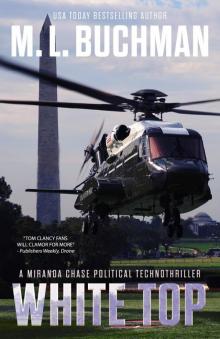 White Top
White Top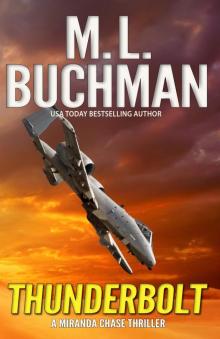 Thunderbolt
Thunderbolt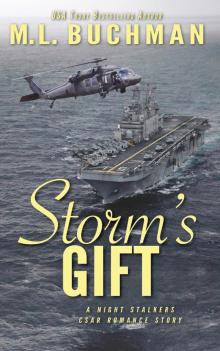 Storm's Gift
Storm's Gift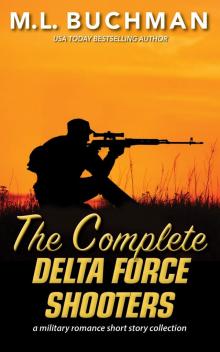 The Complete Delta Force Shooters
The Complete Delta Force Shooters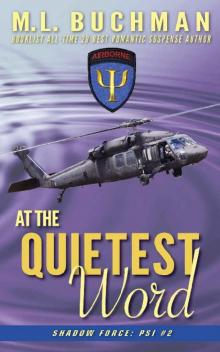 At the Quietest Word (Shadowforce: Psi Book 2)
At the Quietest Word (Shadowforce: Psi Book 2)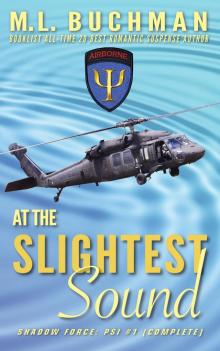 At the Slightest Sound
At the Slightest Sound Dilya's Christmas Challenge
Dilya's Christmas Challenge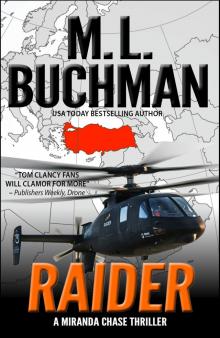 Raider
Raider Havoc
Havoc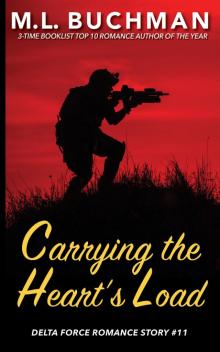 Carrying the Heart's Load
Carrying the Heart's Load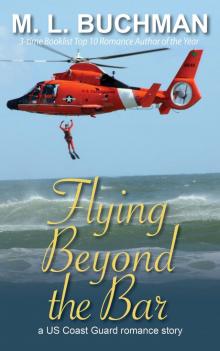 Flying Beyond the Bar
Flying Beyond the Bar Firelights of Christmas
Firelights of Christmas Where Dreams Are Well Done
Where Dreams Are Well Done Nathan's Big Sky
Nathan's Big Sky Heart of a Russian Bear Dog
Heart of a Russian Bear Dog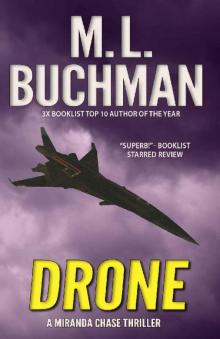 Drone: an NTSB / military technothriller (Miranda Chase Book 1)
Drone: an NTSB / military technothriller (Miranda Chase Book 1) Flower of Destiny
Flower of Destiny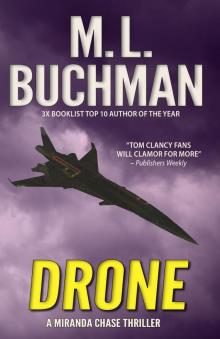 Drone
Drone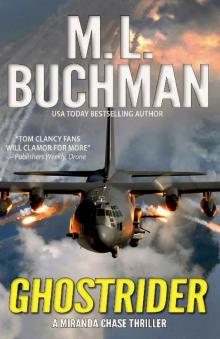 Ghostrider: an NTSB-military technothriller (Miranda Chase Book 4)
Ghostrider: an NTSB-military technothriller (Miranda Chase Book 4)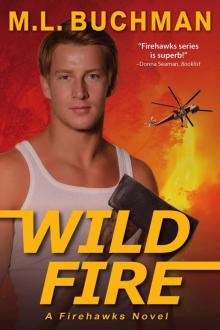 Wild Fire
Wild Fire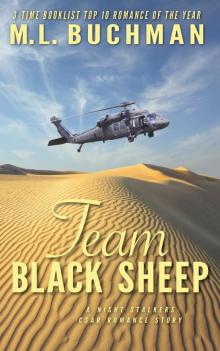 Team Black Sheep
Team Black Sheep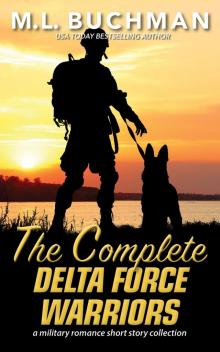 The Complete Delta Force Warriors
The Complete Delta Force Warriors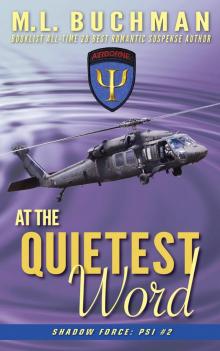 At the Quietest Word
At the Quietest Word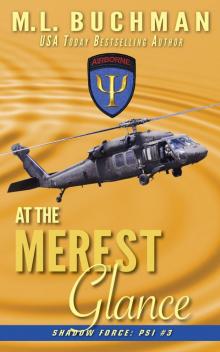 At the Merest Glance
At the Merest Glance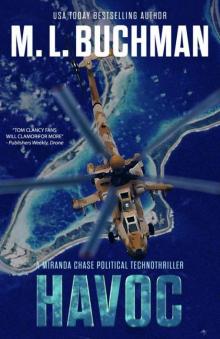 Havoc: a political technothriller (Miranda Chase Book 7)
Havoc: a political technothriller (Miranda Chase Book 7)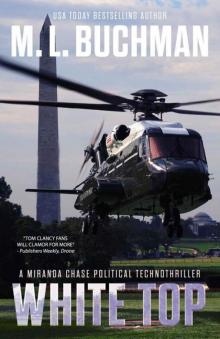 White Top: a political technothriller (Miranda Chase Book 8)
White Top: a political technothriller (Miranda Chase Book 8) Between Shadow and Soul
Between Shadow and Soul Island Christmas
Island Christmas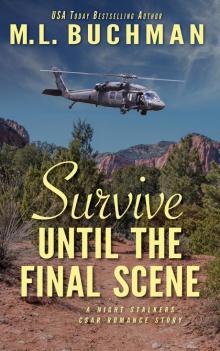 Survive Until the Final Scene
Survive Until the Final Scene Midnight Trust
Midnight Trust Return to Eagle Cove
Return to Eagle Cove Where Dreams Reside
Where Dreams Reside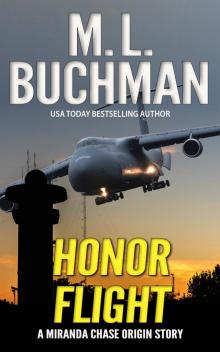 Honor Flight
Honor Flight Where Dreams Are Sewn
Where Dreams Are Sewn The Complete Hotshots
The Complete Hotshots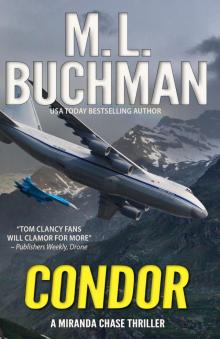 Condor
Condor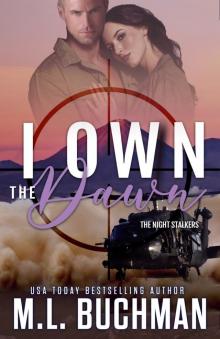 I Own the Dawn
I Own the Dawn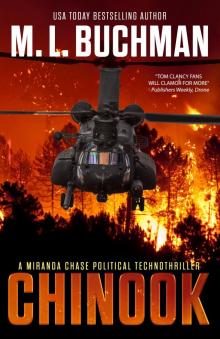 Chinook
Chinook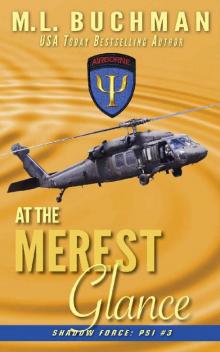 At the Merest Glance: a military paranormal romance (Shadowforce: Psi Book 3)
At the Merest Glance: a military paranormal romance (Shadowforce: Psi Book 3) Since the First Day
Since the First Day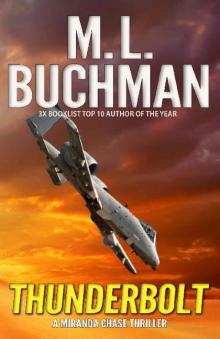 Thunderbolt: an NTSB / military technothriller (Miranda Chase Book 2)
Thunderbolt: an NTSB / military technothriller (Miranda Chase Book 2) For Her Dark Eyes Only
For Her Dark Eyes Only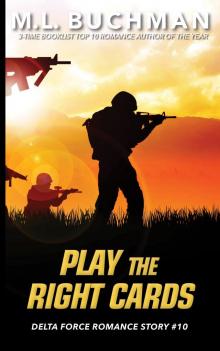 Play the Right Cards
Play the Right Cards Lost Love Found in Eagle Cove
Lost Love Found in Eagle Cove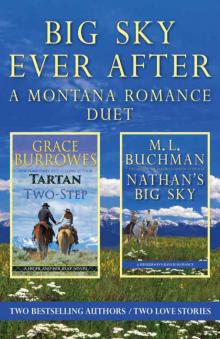 Big Sky Ever After: a Montana Romance Duet
Big Sky Ever After: a Montana Romance Duet Keepsake for Eagle Cove
Keepsake for Eagle Cove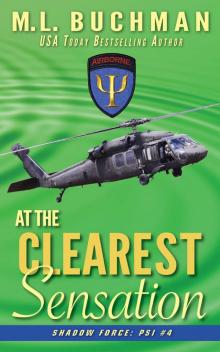 At the Clearest Sensation
At the Clearest Sensation The Ides of Matt 2015
The Ides of Matt 2015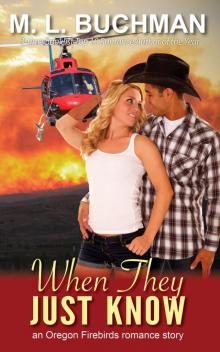 When They Just Know
When They Just Know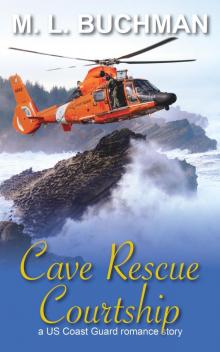 Cave Rescue Courtship
Cave Rescue Courtship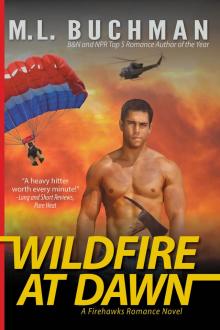 Wildfire at Dawn
Wildfire at Dawn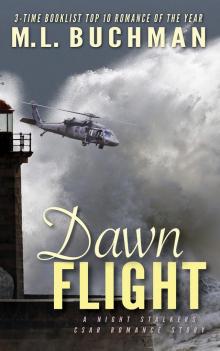 Dawn Flight
Dawn Flight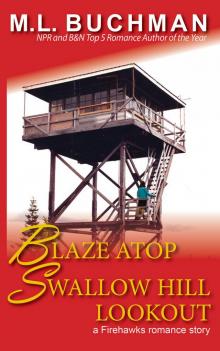 Blaze Atop Swallow Hill Lookout
Blaze Atop Swallow Hill Lookout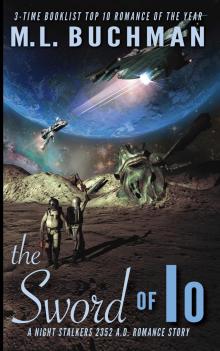 The Sword of Io
The Sword of Io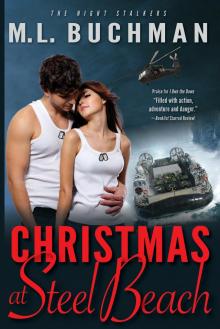 Christmas at Steel Beach
Christmas at Steel Beach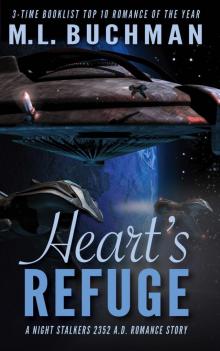 Heart's Refuge
Heart's Refuge By Break of Day (The Night Stalkers)
By Break of Day (The Night Stalkers)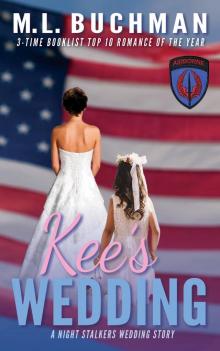 Kee's Wedding
Kee's Wedding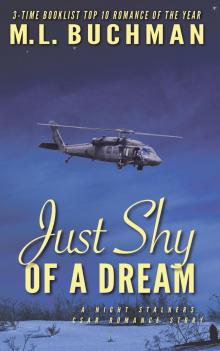 Just Shy of a Dream
Just Shy of a Dream Path of Love
Path of Love Ghost of Willow's Past
Ghost of Willow's Past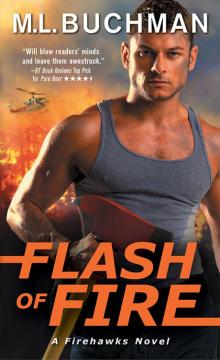 Flash of Fire
Flash of Fire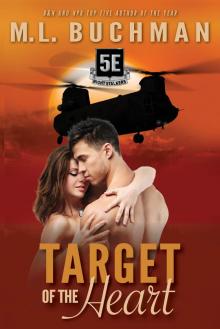 Target of the Heart
Target of the Heart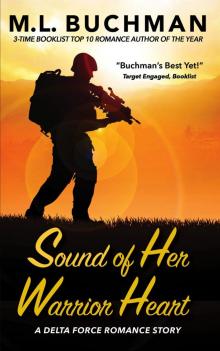 Sound of Her Warrior Heart
Sound of Her Warrior Heart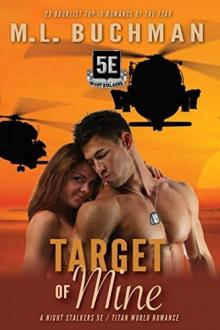 Target of Mine: The Night Stalkers 5E (Titan World Book 2)
Target of Mine: The Night Stalkers 5E (Titan World Book 2) The Complete Where Dreams
The Complete Where Dreams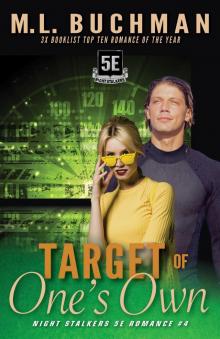 Target of One's Own
Target of One's Own For All Their Days
For All Their Days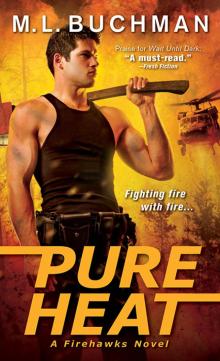 Pure Heat
Pure Heat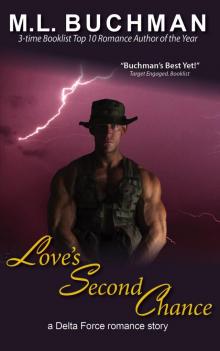 Love's Second Chance
Love's Second Chance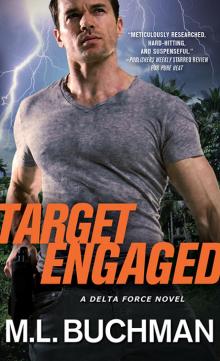 Target Engaged
Target Engaged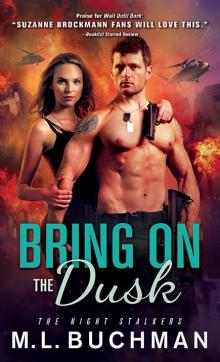 Bring On the Dusk
Bring On the Dusk Wait Until Dark (The Night Stalkers)
Wait Until Dark (The Night Stalkers) Big Sky, Loyal Heart
Big Sky, Loyal Heart Welcome at Henderson's Ranch
Welcome at Henderson's Ranch Damien's Christmas
Damien's Christmas Flight to Fight
Flight to Fight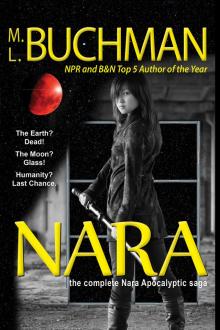 Nara
Nara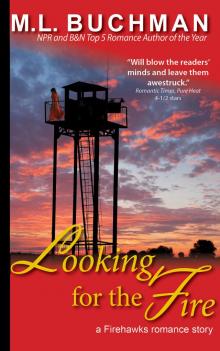 Looking for the Fire
Looking for the Fire Love Behind the Lines
Love Behind the Lines Peter's Christmas
Peter's Christmas In the Weeds
In the Weeds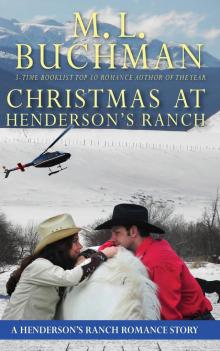 Christmas at Henderson's Ranch
Christmas at Henderson's Ranch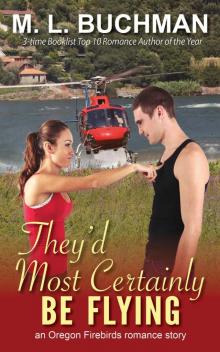 They'd Most Certainly Be Flying
They'd Most Certainly Be Flying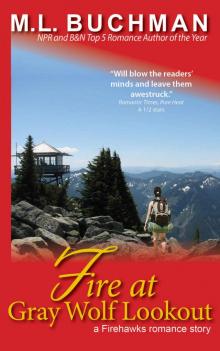 Fire at Gray Wolf Lookout (Firehawks Book 8)
Fire at Gray Wolf Lookout (Firehawks Book 8)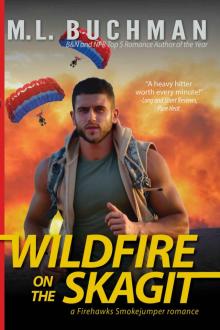 Wildfire on the Skagit (Firehawks Book 9)
Wildfire on the Skagit (Firehawks Book 9)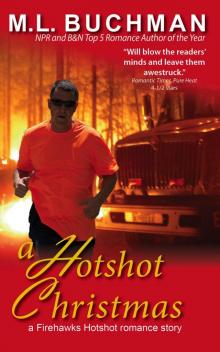 A Hotshot Christmas
A Hotshot Christmas Off the Leash
Off the Leash Where Dreams Books 1-3
Where Dreams Books 1-3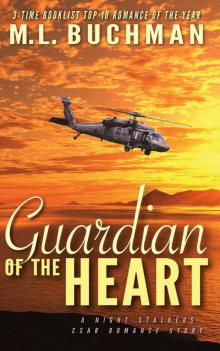 Guardian of the Heart
Guardian of the Heart The Ides of Matt 2017
The Ides of Matt 2017 Where Dreams Unfold
Where Dreams Unfold Twice the Heat
Twice the Heat Wild Justice (Delta Force Book 3)
Wild Justice (Delta Force Book 3) Flying Over the Waves
Flying Over the Waves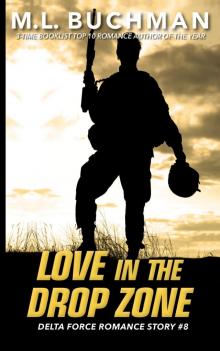 Love in the Drop Zone
Love in the Drop Zone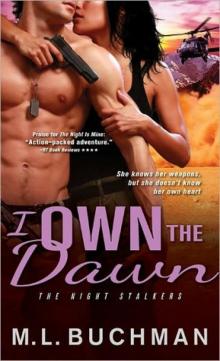 I Own the Dawn: The Night Stalkers
I Own the Dawn: The Night Stalkers What the Heart Holds Safe (Delta Force Book 4)
What the Heart Holds Safe (Delta Force Book 4) The Christmas Lights Objective
The Christmas Lights Objective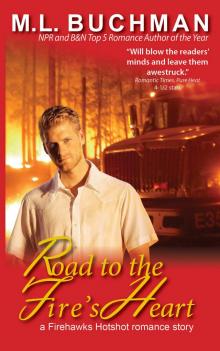 Road to the Fire's Heart
Road to the Fire's Heart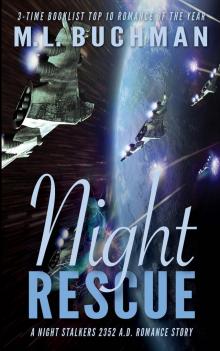 Night Rescue
Night Rescue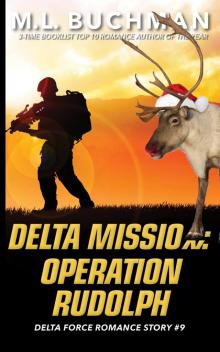 Delta Mission: Operation Rudolph
Delta Mission: Operation Rudolph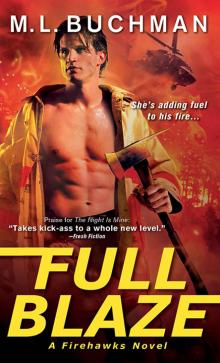 Full Blaze
Full Blaze Night Is Mine
Night Is Mine Lightning Strike to the Heart
Lightning Strike to the Heart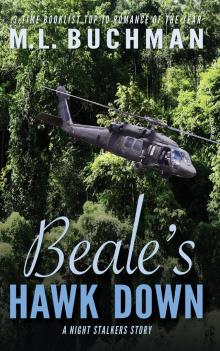 Beale's Hawk Down
Beale's Hawk Down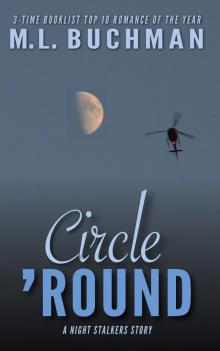 Circle 'Round
Circle 'Round Cookbook from Hell Reheated
Cookbook from Hell Reheated Zachary's Christmas
Zachary's Christmas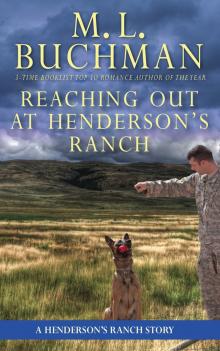 Reaching Out at Henderson's Ranch
Reaching Out at Henderson's Ranch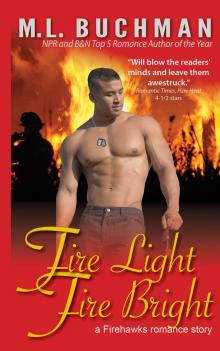 Fire Light Fire Bright
Fire Light Fire Bright The Ides of Matt 2016
The Ides of Matt 2016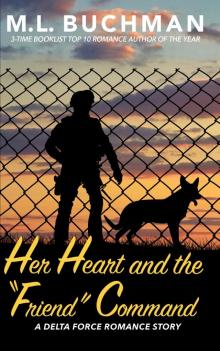 Her Heart and the Friend Command
Her Heart and the Friend Command On Your Mark
On Your Mark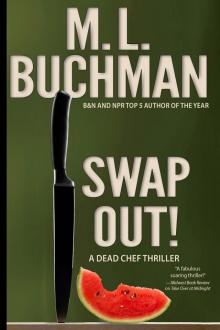 Swap Out!
Swap Out! Heart of the Cotswolds: England
Heart of the Cotswolds: England The Phoenix Agency_The Sum Is Greater
The Phoenix Agency_The Sum Is Greater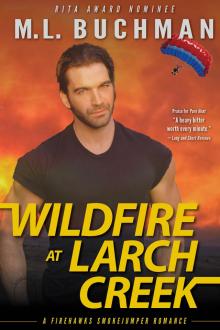 Wildfire at Larch Creek
Wildfire at Larch Creek Target Lock On Love
Target Lock On Love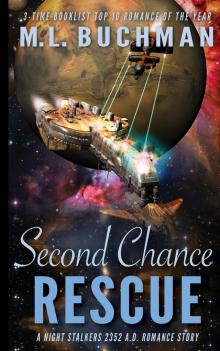 Second Chance Rescue
Second Chance Rescue Where Dreams Are Written
Where Dreams Are Written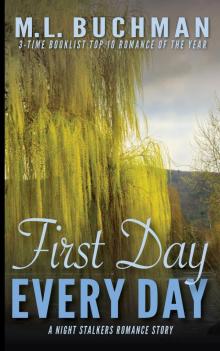 First Day, Every Day
First Day, Every Day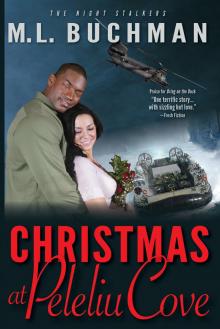 Christmas at Peleliu Cove
Christmas at Peleliu Cove Heart Strike
Heart Strike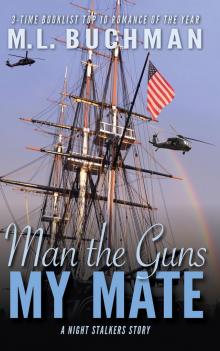 Man the Guns, My Mate
Man the Guns, My Mate Emily's Wedding
Emily's Wedding Daniel's Christmas
Daniel's Christmas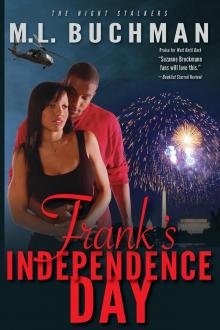 Frank's Independence Day
Frank's Independence Day The Phoenix Agency: The Sum Is Greater (Kindle Worlds Novella)
The Phoenix Agency: The Sum Is Greater (Kindle Worlds Novella)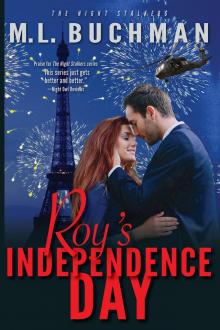 Roy's Independence Day
Roy's Independence Day